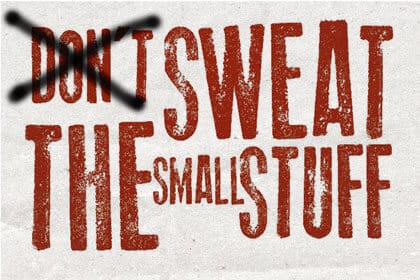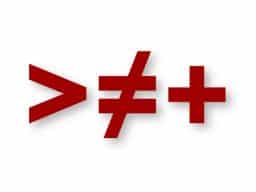Links, content, social signals, user engagement metrics…
None of that means a damned thing if your site isn’t optimized to do what it is supposed to do!
If you read any of the online marketing blogs or forums where SEO is discussed, you might get the impression that search marketing is comprised of only two components: Content and Links. Yes, as everyone has repeatedly said (including me), content marketing is a great way to get ahead in the search results. And incoming links to your site are still a big part of how Google decides who ranks for what search terms – though Google is thinking about changing that.
In the SEO echo chamber, where there are few thought leaders and millions of followers who repeat what they read without a second thought, it seems as if everyone has almost forgotten about the actual optimization of the site and that content. It is beginning to show on the websites of SEO clients, too. Website owners have been sold a lot of infographics, blog articles and other “great content” – but no real optimization of the site, or strategic usage of all that content. All the pieces are there, but nobody put them together to make it work!
A top notch content marketing strategy is not for everyone. It requires creativity, usually a healthy budget, and something to write about. Real quality content costs real money to produce – and you will also need to know how to market your content.
Good links that will help your site rank are becoming increasingly difficult to obtain, and the “easy” links don’t count for much anymore. Many people see this as an obstacle to successful search marketing and are ready to call it quits and surrender to Pay Per Click (PPC) advertising in order to get any significant traffic from search.
What about the “O” in SEO?
 Have you done all you can do to make the most of what you already have? Is the site really optimized to reach its full potential? Probably not. Many people head straight for link building or even get into content marketing without taking a good, honest look at the site itself.
Have you done all you can do to make the most of what you already have? Is the site really optimized to reach its full potential? Probably not. Many people head straight for link building or even get into content marketing without taking a good, honest look at the site itself.
No matter how well you think your website is optimized, there will always be some room for improvement. That “little” detail may not look like much to the eye, but it can make all the difference in the world to your position in the search results.
Never Really Optimized Your Website? Do It Now!
If your website has not had a thing done to it since the day it was launched, make sure the basics of SEO are handled. That means making sure everything you want to be found is accessible to search engine bots as well as real users, each page has its own unique title and content, and everything works properly. Yeah, I know: your designer said it is already optimized. I have never encountered a brand new website, or even an older one, that could not gain something from a thorough analysis and optimization. Unfortunately, there are some pretty bad apples on the SEO tree. Some of them don’t even bother working on your site at all – they just build links. Even if you have previously worked with a trusted SEO company, what they did a year or two ago may be out of date by now. There could be missed opportunities that were not common practices a few years ago, like schema markup, for example. Even some reputable SEOs really don’t have a very good mastery of on page optimization, or just don’t want to spend the time to lean how to do it well. Revisit everything that has been done in the name of optimization and make sure it still makes sense today.
Before starting any content marketing, or other “off page” promotion, make sure the site and the content you will be promoting are in top shape. This will make link earning much easier.
Re-Optimize, or Un-optimize Older Sites
For older sites that may have already had some SEO work done: do some house cleaning.
Go through the whole site as if you have never seen it before. Does everything make sense – in both the wording and finding your way around the site?
Look for incorrect keyword usage. Have you used some of your keywords too many times, not enough, or in the wrong places?
If you have changed some URLs, moved content from one page to another, or other website remodeling – make sure you didn’t end up with duplicate content. Ideally, no two URLs should have the same content or titles. For some larger eCommerce sites, this can be hard to avoid. Finding and eliminating such duplication will usually make a huge difference, especially if your site has a lot of duplication issues. A crawler like ScreamingFrog can make this job easier and help you find pages you may have forgotten about, but are still found by Google’s bots.
Fix those broken links! Check the whole site for any links that point to pages that no longer exist, or may have been mistyped when they were added. The W3C Validator is a very helpful tool for finding broken links. They have tools to check the quality of your websites’ HTML, CSS and some other useful stuff, too.
Unstuff It
By now, you know that stuffing keywords where they don’t belong can be uncomfortable, er, I mean “unproductive”. If you think you may have gone a little overboard with keywords – overused keywords on the page, in the title, in the image alt tags, and anywhere else you or your SEO thought they should go – clean up that keyword mess. Reducing the overuse of keywords will almost always result in an improvement to your position in organic search results. If there were lots of unnecessary key phrases visible on the page, it is going to improve the way you look to users, too.
Speed It Up
Everyone has broadband now, and even our phones have faster internet service than our homes had just a few years ago. It is still important to make sure your website’s pages load as efficiently and quickly as possible. Why? Well, not everyone has a blazing fast connection, and optimizing the loading time of your website makes it much “snappier” for all users. Did you ever get frustrated with a sluggish site and click away, never to return? Don’t let that happen to you. If that isn’t enough, Google says you should make sure your site is fast too. Google also has the Page Speed Insights tool to recommend ways to speed up your site’s loading time: https://developers.google.com/speed/pagespeed/insights/
Little Things Mean A Lot
This all may sound like a drop in the ocean – too insignificant to make a difference. But more is not always better in SEO. Just a few misplaced links or duplicated pages can translate to a difference of several positions in the search results. Attention to the little details of your website can bring about the biggest improvements to your website’s rankings, traffic and your success online.
If you don’t know where to begin, or think you just aren’t obsessive enough to fine tune all those little details, we can help. It’s what we do. A professional SEO Audit will find all of those undiscovered opportunities within your website and give you a clear view of the way forward.



